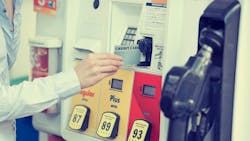When selecting a fuel card for your business, the decision goes beyond mere convenience. It involves understanding how a fuel card can offer security, efficiency, and financial control over your fleet's fuel consumption. Here are 10 essential considerations to guide you through choosing a fuel card that suits your needs with a focus on preventing fuel fraud and enhancing security.
1. Network coverage and site locations
Ensure the fuel card you choose has an extensive network matching your fleet's operational area. Accessibility to a wide range of service stations will minimize route deviations and help maintain efficient fuel usage. Watch out for “in-network” and “out-of-network” terms.
RoadFlex partners with Visa and is accepted at all gas stations and truck stops nationwide.
2. Fuel fraud and theft prevention features
Security is paramount. Look for cards that offer robust fraud prevention features, such as SMS security, pump shut-off limits, and the ability to restrict purchases to fuel only. Some cards also provide real-time alerts for suspicious transactions.
3. Detailed reporting and analytics
A fuel card should offer comprehensive reporting capabilities, enabling you to monitor and analyze fuel spending, track individual vehicle usage, and identify trends or anomalies. This level of detail can help detect and prevent fraudulent activities.
4. Cost management and control
Ensure there are no hidden fees. Understand all invoiced charges, including sign-up fees, monthly fees, and per-transaction fees when out of network. Assess whether the card offers cost-saving opportunities, such as discounted fuel prices or cash-back rewards, which can offset these costs.
5. Customization and control
Select a fuel card that allows you to customize usage settings for each card or driver. The ability to set specific spending limits, restrict usage times, or approve purchase types can enhance control over fuel expenditures.
See also: Fuel retailers urge FHWA to harmonize state application standards under NEVI grant program
6. Integration with fleet management systems
Check if the fuel card can integrate with your existing fleet management software. Integration can streamline operations, improve data accuracy, and offer deeper insights into your fleet's performance and efficiency.
7. Customer success and support options
Great customer success and support options are crucial. Ensure the provider offers support all seven days of the week to address issues that may arise. The ability to speak to a human for urgent issues can be invaluable.
8. Real-time alerts and monitoring
Choose a fuel card that offers real-time alerts for transactions, allowing you to quickly identify and respond to any suspicious activity. Monitoring capabilities should include the ability to track spending by vehicle, driver, time of day, and location.
9. No hidden fees
Traditional fuel card providers are known for their bloated fee structures and hidden fees. Make sure you pick a fuel card with no out-of-network fees, invoice fees, transaction fees, or card replacement fees, amongst others.
10. Digital receipts
Customers will receive an itemized digital receipt for each of their purchases. This ensures that all transaction records are automatically stored and easily accessible, facilitating efficient expense tracking and reporting.
Overall, when selecting a fuel card, prioritizing features that enhance security and prevent fuel fraud is essential. Fraud accounts for over 12% of all fleet expenses and must not be overlooked. By carefully considering these 10 factors, businesses can choose a fuel card that not only offers convenience and cost savings but also protects against card misuse, fuel theft, and fuel fraud. This ultimately has a significant impact on a company’s fleet costs.
About the Author

Rush Akin
Rush is an experienced veteran in the fleet industry, with over 20 years of experience in fleet management. Before joining RoadFlex, Rush served as the SVP of sales for Solera, where he was in charge of overseeing fleet sales and business development in North America. Prior to Solera, Rush worked with well-known brands in the industry, such as Rand McNally, Lytx, FourKytes, and Syntech Systems Fuel Master. Rush has a strong background in fleet and fuel management, as well as customer success.
